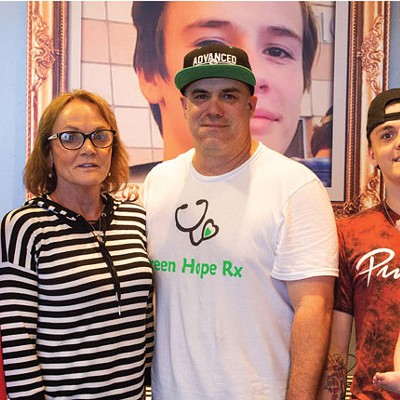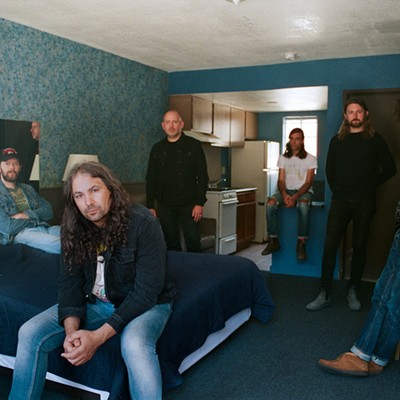When discussing popular hip-hop music trends, one that usually is not mentioned is the chart-topping spiritually themed rap song. Yet those who take a look at the list of top-selling rap artists and singles the last few years might be surprised by what they find.
Chicago rapper-singer Chance the Rapper won a Best Rap Album Grammy in 2016 for his streaming-only mixtape Coloring Book, which at times feels more like a rap-influenced gospel album than the other way around. This year’s top-selling rap album is Kendrick Lamar’s Damn, which lacks Chance’s overall gospel music influence but is richer with philosophical theology.
But years before either of these rappers were finding wide commercial success with religious themes, suburban New York emcee and vocalist Matisyahu had songs on the U.S. Top 40 incorporating Jewish Orthodox tradition.
Matisyahu, the Hebrew and stage name of the man born Matthew Paul Miller, is most remembered as the white, long-bearded Hasidic artist who scored 2000s rap-influenced reggae and dancehall hits like 2004’s “King Without a Crown” and 2009’s “One Day” (the latter was co-written by Bruno Mars). It was a landmark day for his fans when he shaved off his trademark beard in 2011. Today, with bleached hair, the former highly recognizable artist can now walk the streets in comparative anonymity.
The vocalist spoke by phone with Oklahoma Gazette ahead of his Nov. 1 show at The Jones Assembly, 901 W. Sheridan Ave. Matisyahu said he is excited to see other artists having success while expressing their faith in their art — even if their beliefs differ from his own.
“Hip-hop is always going in different directions at once,” he said. “You have the whole trap thing going on, and at the same time, you have Kendrick Lamar and Chance the Rapper and that kind of thing. I think it’s cool when things venture out into different directions and find a nice middle ground.”
Outspoken spirituality is not the only trend that had Matisyahu as a forerunner. In today’s rap and pop worlds, dancehall and Caribbean sounds are in vogue, as heard on several songs from Justin Bieber, Drake and Rihanna.
Of course, it would be a mistake to count Matisyahu as a true originator in either musical spirituality or the dancehall style. He doesn’t keep his influences or inspirations hidden and said he is interested in watching how trends from certain cultures sometimes bleed into others.
“Before you saw hip-hop artists with skinny jeans and all that kind of thing, that was happening in the Caribbean culture first,” he said. “Around Jackie Robinson Park in Crown Heights back in the early 2000s, the young West Indian kids already had that style going. Then you saw that style cross over into the hip-hop world.”
‘Unified front’
His current Broken Crowns tour began earlier this month, but Matisyahu said he feels like his life has been one long road run since 2004. He estimates that he plays 250-300 live dates each year.Aside from Matisyahu and his band, the tour also includes the California reggae rock and pop quartet Common Kings and Orphan, an instrumental hip-hop trio of 22-year-olds.
Matisyahu said he first connected with Common Kings after hiring his new manager Ivory Daniel. Both are managed through Daniel’s company Regime Management and became quick friends. Matisyahu collaborated with Common Kings on the new single “Broken Crowns,” which was released to digital platforms Oct. 13 and takes its title from the name of their shared tour.
Orphan is a group heavily inspired by Matisyahu’s music and made up of three sons of Lubavitch rabbis. Matisyahu has known one of the members since he was 8 years old.
The vocalist said he has been in the music business long enough to know that it is rare when everyone involved in a tour gets along swimmingly. He has known bands that have gone on the road with acts they don’t like and bands that don’t even have peaceful cohesion within their own group.
“A lot of times, you tour and the opening acts, they’re more strategic — placed there by the agents or to help sell tickets,” he said.
That is not the case on the Broken Crowns tour, Matisyahu said. He knows it is cliché, but the grouping feels like family.
“It’s one show,” he said. “It’s not like three different bands. It’s like a unified front.”
The Broken Crowns tour will continue through the end of the year. Matisyahu said when there is togetherness in a group of touring partners, it makes road life much more bearable.
“When you’ve got a unified front, and we’re talking about 30 people or something like that — it’s not the hugest operation, but it’s a lot of people — and when everyone is vibing and taking care of each other, it makes a big difference,” he said. “It comes across through the music, and it comes across through the show.”
‘Different things’
Matisyahu’s most recent album is Undercurrent, a record that he has called the most accurate portrayal of himself as an artist.The album was recorded with his live band, which includes drummer Joe Tomino, bassist Stu Brooks, guitarist Aaron Dugan and Big Yuki on keyboards.
Matisyahu said Undercurrent’s reflection of his true artistic self was not a question of control. He said there has never been a time when he did not have creative control over his music. It was more about who he was collaborating with. To him, it always felt like he would be doing one thing in the studio and a different thing on the stage.
“Every time I’ve gone in to make a record, it’s not been the purest example of where I was at musically,” he said. “It’d almost be a side project.”
Undercurrent features just eight songs but runs for over an hour. There is no song shorter than five minutes, which is practically unheard of in modern popular music.
Matisyahu said on this album, he spent a lot of time in improvised jam sessions while developing the new project.
“I decided I wanted to put the focus on improvisation,” he said. “We recorded it and went back and developed songs out of them that are longform songs that are much more like the show than a separate thing.”
The result is an alternative and indie rock soundscape that lets each musical idea come to complete fruition. It might not be the sound some people expect from Matisyahu, but the live band sound isn’t a style he is new to either.
The truth is there is no one sound to expect from Matisyahu. What one remembers the artist for is largely dependent on when they started listening.
“That’s just who I am,” he said. “I’ve always been interested in different things, different styles. That’s the good thing about it; you don’t have to be stuck in any one thing.”
Visit matisyahuworld.com.
Print headline: Crowning moment; A redefined Matisyahu makes a tour stop with Common Kings Nov. 1 at The Jones Assembly.












